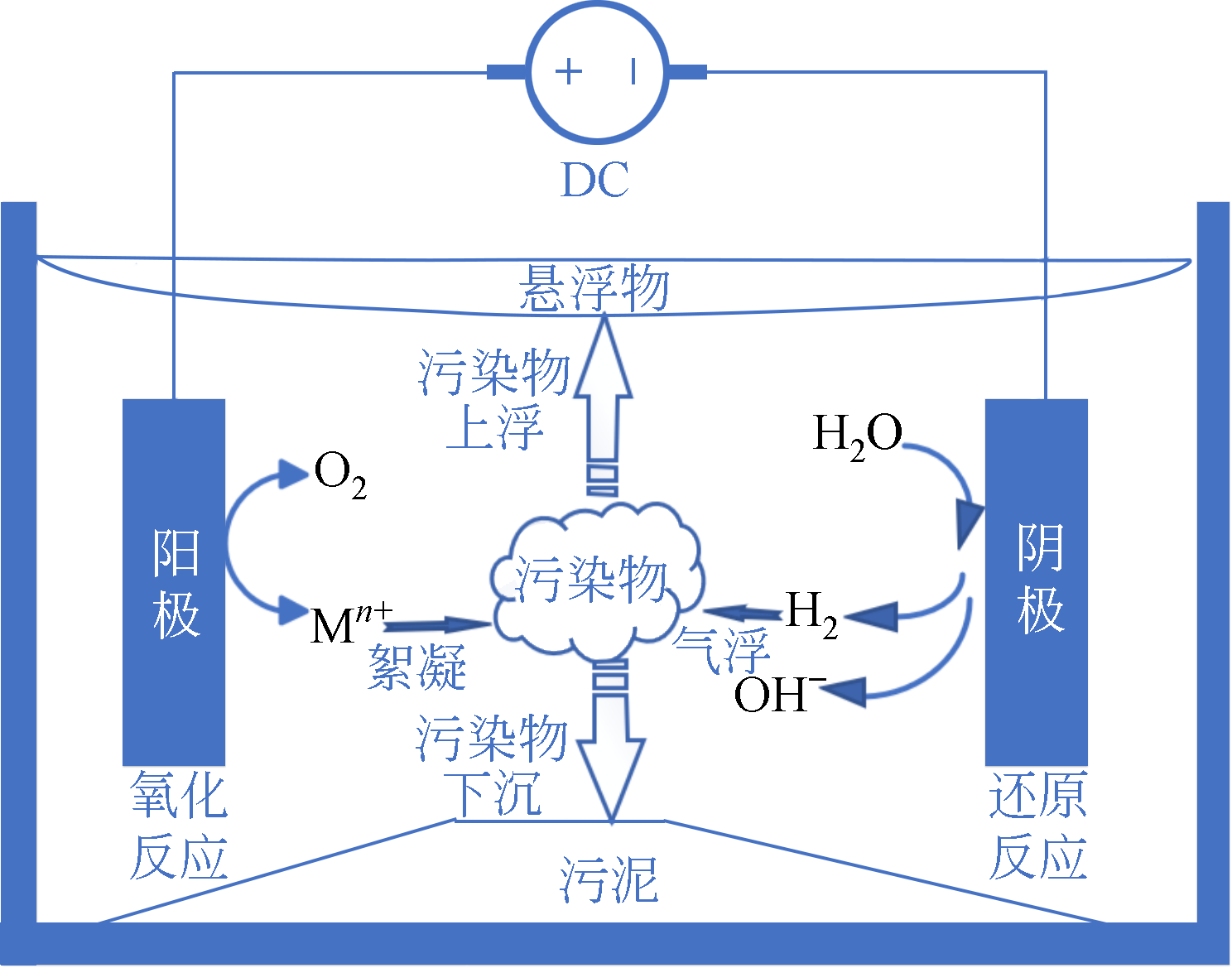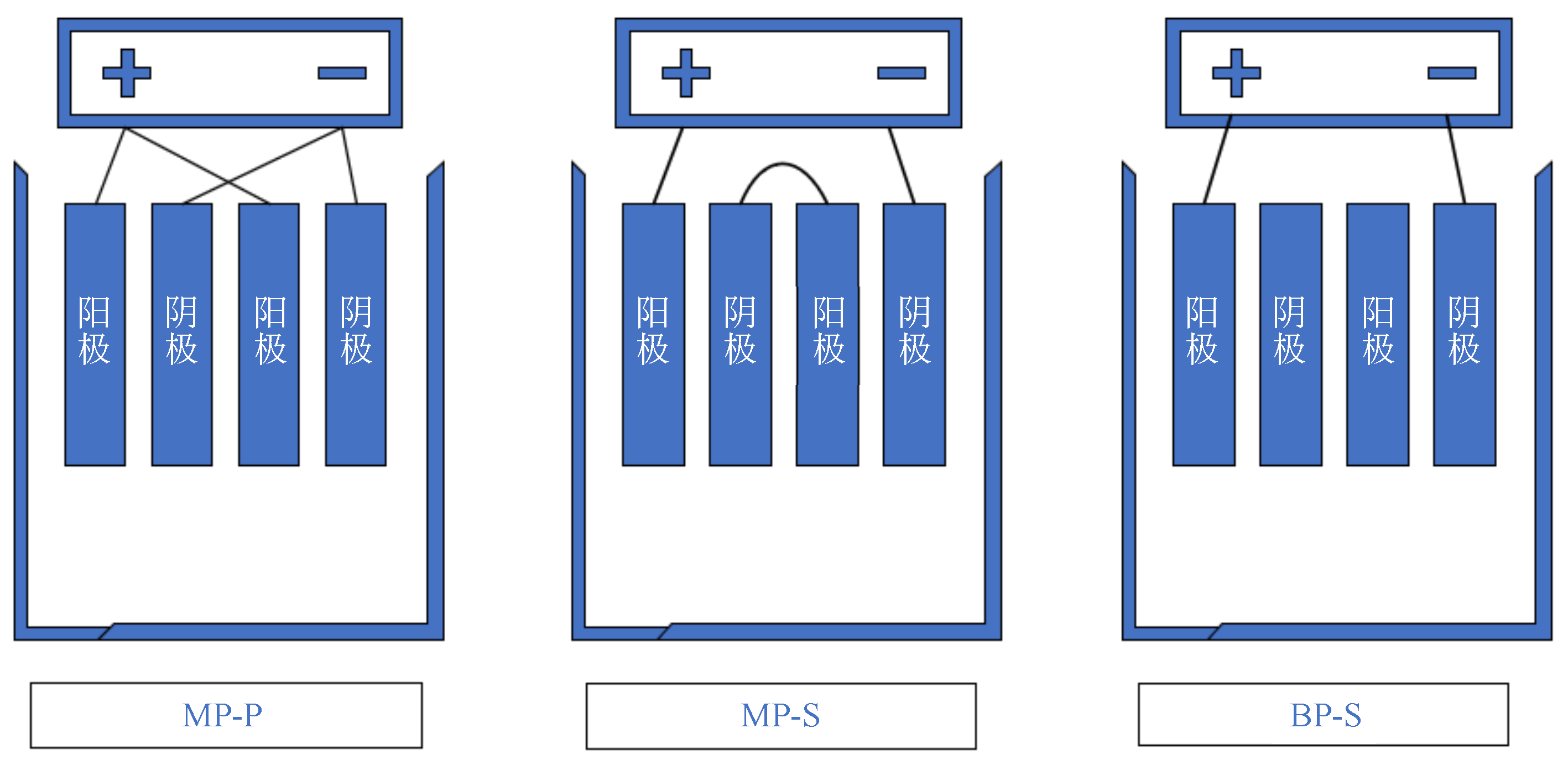| 1 |
CHEN G. Electrochemical technologies in wasterwater treatment[J]. Separation and Purification Technology, 2004, 38(1): 11-41.
|
| 2 |
牛庆林, 曹顺安. 电絮凝法预处理船舶生活污水研究[J]. 应用化工, 2018, 47(3): 541-544, 547.
|
|
NIU Qinglin, CAO Shunan. Study on the pretreatment of ship sewage by electrocoagulation technology[J]. Applied chemistry, 2018,47 (3): 541-544, 547.
|
| 3 |
WANG Y, YAN J, LI Z, et al. The mechanism of removing the organic matter in heavy oil sewage by the electric flocculation method[J]. Petroleum Science and Technology, 2014, 32(13): 1529-1536.
|
| 4 |
张石磊, 江旭佳, 洪国良, 等. 电絮凝技术在水处理中的应用[J]. 工业水处理, 2013, 33(1): 10-14, 19.
|
|
ZHANG Shilei, JIANG Xujia, HONG Guoliang, et al. Application of electrocoagulation technology to water treatment[J]. Industrial Water Treatment, 2013,33 (1): 10-14, 19.
|
| 5 |
LACASA E, CAÑIZARES P, SÁEZ C, et al. Removal of nitrates from groundwater by electrocoagulation[J]. Chemical Engineering Journal, 2011, 171(3): 1012-1017.
|
| 6 |
MHATRE S, VIVACQUA V, GHADIRI M, et al. Electrostatic phase separation: a review[J]. Chemical Engineering Research and Design, 2015, 96(2): 177-195.
|
| 7 |
KUOKKANEN V, KUOKKANEN T, RAMO J, et al. Recent applications of electrocoagulation in treatment of water and wastewater—A review[J]. Green and Sustainable Chemistry, 2013, 3(2): 89-121.
|
| 8 |
VEPSäLäINEN M, SILLANPÄÄ M. Electrocoagulation in the treatment of industrial waters and wastewaters[M]. Advanced Water Treatment. Elsevier, 2020: 1-78.
|
| 9 |
MOUEDHEN G, FEKI M, WERY M D P, et al. Behavior of aluminum electrodes in electrocoagulation process[J]. Journal of Hazardous Materials, 2008, 150(1): 124-135.
|
| 10 |
HOLT P K, BARTON G W, MITCHELL C A. The future for electrocoagulation as a localised water treatment technology[J]. Chemosphere, 2005, 59(3): 355-367.
|
| 11 |
BAZRAFSHAN E, MOHAMMADI L, ANSARIMOGHADDAM A, et al. Heavy metals removal from aqueous environments by electrocoagulation process—A systematic review[J]. Iranian Journal of Environmental Health Science & Engineering, 2015, 13(1): 74-89.
|
| 12 |
MOLLAH M Y, MORKOVSKY P, GOMES J A, et al. Fundamentals, present and future perspectives of electrocoagulation[J]. Journal of hazardous materials, 2004, 114(1/2/3): 199-210.
|
| 13 |
刘兴. 电絮凝法同时去除地下水中氟和镉研究[D]. 广州: 华南理工大学, 2019.
|
|
LIU Xing. Simultaneous Removal of fluorine and cadmium from groundwater by electrocoagulation[D]. Guangzhou:South China University of technology, 2019.
|
| 14 |
HASHIM K S, SHAW A, KHADDAR R AL, et al. Iron removal, energy consumption and operating cost of electrocoagulation of drinking water using a new flow column reactor[J]. Journal of environmental management, 2017, 189: 98-108.
|
| 15 |
胡维, 戴友芝, 刘凯, 等. 基于响应面的电絮凝除As(Ⅲ)研究[J]. 水处理技术, 2014,40(1): 47-51, 55.
|
|
HU Wei, DAI Youzhi, LIU Kai, et al. Study on as (Ⅲ) removal by electrocoagulation based on response surface[J]. Water Treatment Technology, 2014, 40(1): 47-51, 55.
|
| 16 |
KHANDEGAR V, SAROHA A K. Electrocoagulation for the treatment of textile industry effluent—A review[J]. Journal of Environmental Management, 2013, 128: 949-963.
|
| 17 |
MALINOVIC B N, PAVLOVIC M G. Decolorization of reactive violet 5 dye in textile wastewater by electrocoagulation[J]. Journal of Electrochemical Science and Engineering, 2016, 6(1): 67-75.
|
| 18 |
丁春生, 徐洋洋, 陈姗, 等. 电絮凝法处理铬黑T染料废水的研究[J]. 印染助剂, 2013, 30(6): 39-42.
|
|
DING Chunsheng, XU Yangyang, CHEN Shan, et al. Study on treatment of Eriochrome Black T dye wastewater with electro coagulation method[J]. Printing and dyeing auxiliaries, 2013,30 (6): 39-42.
|
| 19 |
丁学姣. 电絮凝强化处理船舶生活污水研究[D]. 哈尔滨: 哈尔滨工程大学, 2018.
|
|
DING Xuejiao. Research on enhancing treatment of ship domestic sewage by electro-coagulation [D].Harbin:Harbin Engineering University, 2018.
|
| 20 |
EL-TAWEEL Y A, NASSEF E M, ELKHERIANY I, et al. Removal of Cr (Ⅵ) ions from waste water by electrocoagulation using iron electrode[J]. Egyptian Journal of Petroleum, 2015, 24(2): 183-192.
|
| 21 |
谭超雄, 曾晨辉, 梁继业, 等. 电絮凝处理含铜铬电镀废水的研究[J]. 山东化工, 2015, 44(13): 156-157, 162.
|
|
TAN Chaoxiong, ZENG Chenhui, LIANG Jiye, et al. Study on electrocoagulation of electroplating wastewater containing copper and chromium[J]. Shandong Chemical Industry, 2015, 44 (13): 156-157, 162.
|
| 22 |
NGUYEN D D, NGO H H, GUO W, et al. Can electrocoagulation process be an appropriate technology for phosphorus removal from municipal wastewater[J]. Science of The Total Environment, 2016, 563: 549-556.
|
| 23 |
来伟良. 电絮凝法处理含磷废水的试验研究[J]. 能源环境保护, 2015, 29(4): 12-15.
|
|
LAI Weiliang. Study on phosphorus wasterwater with electro-coagulation[J]. Energy and Environmental Protection, 2015, 29 (4): 12-15.
|
| 24 |
FRANCO D, LEE J, ARBELAEZ S, et al. Removal of phosphate from surface and wastewater via electrocoagulation[J]. Ecological Engineering, 2017, 108: 589-596.
|
| 25 |
AN C, HUANG G H, YAO Y, et al. Emerging usage of electrocoagulation technology for oil removal from wastewater: a review[J]. Science of The Total Environment, 2017, 579: 537-556.
|
| 26 |
刘杨, 李玉星, 蒋文明, 等. 电絮凝技术处理油田污水的影响因素实验研究[J].湖南大学学报(自然科学版), 2017, 44(12): 142-149.
|
|
LIU Yang, LI Yuxing, JIANG Wenming, et al. Experimental study on influence factors of oil field wastewater[J]. Journal of Hunan University (Natural Science Edition), 2017, 44 (12): 142-149.
|
| 27 |
GOBBI L C, NASCIMENTO I L, MUNIZ E P, et al. Electrocoagulation with polarity switch for fast oil removal from oil in water emulsions[J]. Journal of Environmental Management, 2018, 213: 119-125.
|
| 28 |
DEMIRCI Y, PEKEL L C, ALPBAZ M. Investigation of different electrode connections in electrocoagulation of textile wastewater treatment[J]. International Journal of Electrochemical Science, 2015, 10(3): 2685-2693.
|
| 29 |
KOBYA M, DEMIRBAS E. Evaluations of operating parameters on treatment of can manufacturing wastewater by electrocoagulation[J]. Journal of Water Process Engineering, 2015, 8: 64-74.
|
| 30 |
KHANDEGAR V, SAROHA A K. Electrocoagulation for the treatment of textile industry effluent—A review[J]. Journal of Environmental Management, 2013, 128: 949-963.
|
| 31 |
KOBYA M, GENGEC E, DEMIRBAS E. Operating parameters and costs assessments of a real dyehouse wastewater effluent treated by a continuous electrocoagulation process[J]. Chemical Engineering and Processing: Process Intensification, 2016, 101: 87-100.
|
| 32 |
TROMPETTE J L, VERGNES H. On the crucial influence of some supporting electrolytes during electrocoagulation in the presence of aluminum electrodes[J]. Journal of Hazardous Materials, 2009, 163(2/3): 1282-1288.
|
| 33 |
费琼, 王少坡, 罗伟, 等. 电絮凝法在水处理过程中影响因素研究现状[J]. 工业水处理, 2016, 36(12):16-21.
|
|
FEI Qiong, WANG Shaopo, LUO Wei, et al. Current situation of the research on the influencing factors of electro-coagulation method in the process of water treatment[J]. Industrial Water Treatment, 2016,36 (12): 16-21.
|
| 34 |
MANSOORIAN H J, MAHVI A H, JAFARI A J. Removal of lead and zinc from battery industry wastewater using electrocoagulation process: influence of direct and alternating current by using iron and stainless steel rod electrodes[J]. Separation and Purification Technology, 2014, 135: 165-175.
|
| 35 |
GATSIOS E, HAHLADAKIS J N, GIDARAKOS E. Optimization of electrocoagulation (EC) process for the purification of a real industrial wastewater from toxic metals[J]. Journal of Environmental Management, 2015, 154: 117-127.
|
| 36 |
LINARES-HERNáNDEZ I, BARRERA-DíAZ C, ROA-MORALES G, et al. Influence of the anodic material on electrocoagulation performance[J]. Chemical Engineering Journal, 2009, 148(1): 97-105.
|
| 37 |
BARRERA-DíAZ C, ROA-MORALES G, ÁVILA-CÓRDOBA L, et al. Electrochemical treatment applied to food-processing industrial wastewater[J]. Industrial & Engineering Chemistry Research, 2006, 45(1): 34-48.
|
| 38 |
冯利, 汤鸿霄. 铝盐最佳混凝形态及最佳pH范围研究[J]. 环境化学, 1998(2): 163-169.
|
|
FENG Li, TANG Hongxiao. Study on the optimal coagulation form and pH range of aluminum salt[J]. Environmental Chemistry, 1998 (2): 163-169.
|
| 39 |
MORENO A C H, COCKE D L, GOMES J A, et al. Electrochemical Reactions for Electrocoagulation Using Iron Electrodes[J]. Industrial & Engineering Chemistry Research, 2009, 48(4): 2275-2282.
|
 ), Xiaosan SONG1,2(
), Xiaosan SONG1,2( ), Sanfan WANG1,2
), Sanfan WANG1,2

